|
Versión en español
To  talk about Jeff Rona means to talk about one of the most talented composers raised by Media Ventures studios. Born in Culver City (L.A.) 47 years ago (03-03-1957), he hit the skies in 1995 with his unforgetable score for "White Squall" talk about Jeff Rona means to talk about one of the most talented composers raised by Media Ventures studios. Born in Culver City (L.A.) 47 years ago (03-03-1957), he hit the skies in 1995 with his unforgetable score for "White Squall"
Nowadays, he is again on the wave thanks to his valuable work in Traffic: The Miniseries.
Surely, the following interview, that he kindly granted BSO Spirit, will help us know this composer a bit better.
BSO Spirit (BS): Before starting with the questions,
we would like to thank you for your attention, it's a privilege for us to
have the chance of having an interview with you.
First of all, can you tell us how you did start composing film music? How did
you become a member of Media Ventures?
Jeff Rona (JR): I was composing different kinds of concert music, as well
as working on a lot of pop records before I did any film music. I scored student
films, short films, anything I could get my hands on. As a busy synth programmer
in Los Angeles, many of my clients were film composers who would hire me to create
cool sounds for their projects. I did a lot of ghost writing for some of them,
which was a great "film school" for me.
A mutual friend introduced me to Hans to do some sampling, and we became
very close friends right away. A year or two later I moved my studio to Media
Ventures and began writing from there.
BS: It is well known that working as a team can be quite a difficult task sometimes, but in Media Ventures this is a very frequent system. How do you manage to get this harmony and the organization needed to work with other people? Do you like working like that?
JR: It's best if one person is in charge of the project and can give assignments to any collaborators. This avoids a lot of arguing, guessing, and time wasting. I did very little of this kind of collaborating. Typically I did my own projects, on my own, and only occasionally lent a hand with any other MV scores.
BS: 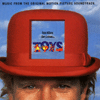 Your first collaboration with Hans Zimmer was Toys, for which you wrote additional music. It was followed by scores as charismatic as The Fan, The Prince of Egypt, The Thin Red Line, Gladiator or Black Hawk Down. How is it working with Mr. Zimmer? Please tell us about your relationship with this composer. Your first collaboration with Hans Zimmer was Toys, for which you wrote additional music. It was followed by scores as charismatic as The Fan, The Prince of Egypt, The Thin Red Line, Gladiator or Black Hawk Down. How is it working with Mr. Zimmer? Please tell us about your relationship with this composer.
JR: Because my writing style and methods are very different than Hans', I mostly did cues that did not relate to his themes. they were original ideas for specific scenes or characters. Hans knows what he wants, and knows how to get it. He doesn't ask anyone to do something he can't. He just likes to have the extra time to work very carefully, even under a tough deadline.
I have always been inspired by Hans, and I think I have been able to contribute a few good ideas to his projects.
BS: The Prince of Egypt was chosen by the BSO Spirit Community as the best animation soundtrack of all the times. You played the Middle Eastern Woodwins. Did you take part in other creative aspects of this soundtrack?
JR: Better than the score to The Iron Giant?? That's my favorite. I love Fantasia, Sleeping Beauty, The Lion King and Finding Nemo as well. I played a lot of the North African instruments, and then worked closely with all the other eastern musicians. Very complex work. A lot of conducting, and a lot of editing.
BS: 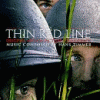 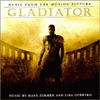 The Thin Red Line was one of the most ambitious projects in Hans Zimmer's career. He has stated that he dedicated one full year to compose the music. You are credited in the inner notes of the booklet as the maker of "Visceral Ambience". What can you tell us about your participation in this project? The Thin Red Line was one of the most ambitious projects in Hans Zimmer's career. He has stated that he dedicated one full year to compose the music. You are credited in the inner notes of the booklet as the maker of "Visceral Ambience". What can you tell us about your participation in this project?
JR: There was a group of compositions by another composer as part of the score.
A lot of effort was put toward the recording of pieces using some very unusual, one of a kind instruments that would create the 'music of fear and chaos' in the film. This was to set a stark contrast to the austerity of Hans' score. However, at the last minute it was decided that these pieces lacked the energy and punch needed for these scenes. So I replaced them using my own methods. Due to some political issues, my credit had to be this strange one.
BS: Your contribution in Gladiator is also very interesting and worth mentioning, as can be heard on the CD "More Music from Gladiator". We are talking about the track titled "Marrakesh Marketplace"...
JR: I created all the 'street music' that is heard throughout Gladiator. I did some research into the music of the region, and played some north African flutes to approximate the sound and feel of the period.
BS: 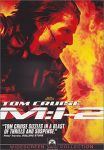 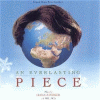 That same year, you repeated experience with Zimmer both in M:I 2 and An Everlasting Piece. In the first one you were a member of the M:I Band and in the second one a member of The Jings... Can you tell us something about that experience? That same year, you repeated experience with Zimmer both in M:I 2 and An Everlasting Piece. In the first one you were a member of the M:I Band and in the second one a member of The Jings... Can you tell us something about that experience?
JR: I played Irish pennywhistle on some tracks of An Everlasting Piece, and wrote one tune that didn't end up in the final soundtrack of the movie.
On MI2 I collaborated with cellist Martin Tillman on a great deal of the score.
That was a very collaborative project. A lot of music written in a very compressed schedule!
BS: And in Black Hawk Down?
JR: I came in about halfway through the project, and wrote my own themes and pieces, some to picture, and some just as a library of music for the editors to use as they wished. Many are in the film, and fragments of them appear in other people's cues as well. It's also the first score I did creating everything completely inside one computer with only software. It was a chance to experiment with what was possible. Very successful.
BS: 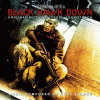 You have also worked with other composers like Mark Isham (The Net, Chicago Hope), Philip Glass (Powaqqatsi) or Cliff Martínez (Kafka and Traffic). I suppose that each of them would have their own working method, isn't it? You have also worked with other composers like Mark Isham (The Net, Chicago Hope), Philip Glass (Powaqqatsi) or Cliff Martínez (Kafka and Traffic). I suppose that each of them would have their own working method, isn't it?
JR: Absolutely. Hans Zimmer and Media Ventures are not the typical method of film scoring. But it is hard to describe. With every composer I have had the pleasure to work with, I have given and gotten something unique in return.
BS: 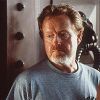 Your first great work alone was for a Ridley Scott film titled White Squall. How did this project come to your hands? Your first great work alone was for a Ridley Scott film titled White Squall. How did this project come to your hands?
JR: That was thanks to Hans. A score had been written for the film, but discarded for a number of reasons. I never heard it. Ridley had worked with Hans and asked for help. Hans suggested me to Ridley, and I started about one day later.
BS: 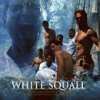 Your beautiful and evocative score grasped perfectly the very essence of the friendship and fellowship between the Albatros young students and the rest of the crew in the ship, specially their Captain. What would you highlight in this work? Is there any particular scene that you enjoyed writing music for? Your beautiful and evocative score grasped perfectly the very essence of the friendship and fellowship between the Albatros young students and the rest of the crew in the ship, specially their Captain. What would you highlight in this work? Is there any particular scene that you enjoyed writing music for?
JR: Thanks for the kind words. I wanted to blend a sense of mystery to the film - a voyage of discovery. In addition to the orchestra, I played a number of instruments, including many conch shells! My favorite cue from that is the scene in the storm and sinking of the ship. An elegy for strings.
BS: What was Mr. Zimmer´s participation in this work?
JR: He listened to some of my cues, and gave me his opinions. But nothing else. I wrote the entire score myself in just under three weeks.
BS: 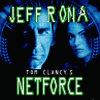 Subsequent to that, you worked in Netforce (a film based on a Tom Clancy´s novel), in The In Crowd, a story about vengeance, suspicion and betrayal. Last year you worked in Shelter Island, a Thriller starring Stephen Baldwin and Patsy Kensit. These three films didn't do well in the box office, and yet they have interesting scores, especially The in Crowd, which can be purchased together with Netforce at your web site. Please tell us about these works. Subsequent to that, you worked in Netforce (a film based on a Tom Clancy´s novel), in The In Crowd, a story about vengeance, suspicion and betrayal. Last year you worked in Shelter Island, a Thriller starring Stephen Baldwin and Patsy Kensit. These three films didn't do well in the box office, and yet they have interesting scores, especially The in Crowd, which can be purchased together with Netforce at your web site. Please tell us about these works.
JR: 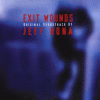 Every composer has films that don't do as well as one would hope. I don't feel my music for these films is any less than on my more successful projects. One of my least favorite films that I scored, "Exit Wounds" for producer Joel Silver was a number one film for 2 or 3 weeks and did very well. "The Mothman Prophecies", directed by Mark Pellington, was a modest success. The ones you mentioned were not successful, though I am somewhat fond of the score to The In Crowd. I don't know why! Every composer has films that don't do as well as one would hope. I don't feel my music for these films is any less than on my more successful projects. One of my least favorite films that I scored, "Exit Wounds" for producer Joel Silver was a number one film for 2 or 3 weeks and did very well. "The Mothman Prophecies", directed by Mark Pellington, was a modest success. The ones you mentioned were not successful, though I am somewhat fond of the score to The In Crowd. I don't know why!
BS: Your works for television are quite varied.
From The Critics and High Incident to Homicide Life on
the Street on Video, not to mention your music for two series taking
place in hospitals like Chicago Hope and L.A. Doctors. Is working
for TV very different from working for cinema?
JR: 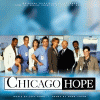 Yes.
There is little time, and budgets are modest. So you must be more clever. the
score to Homicide broke every rule of TV music genre. No one was using
samples of police radios, sirens, glass bowls, ethnic percussion, ambient guitars,
and just plain weird noise to score a police drama. But I did! Barry Levinson,
the producer of Homicide, insisted that the score sound like nothing else
on TV. Yes.
There is little time, and budgets are modest. So you must be more clever. the
score to Homicide broke every rule of TV music genre. No one was using
samples of police radios, sirens, glass bowls, ethnic percussion, ambient guitars,
and just plain weird noise to score a police drama. But I did! Barry Levinson,
the producer of Homicide, insisted that the score sound like nothing else
on TV.
Projects like Chicago Hope are all about emotion, so I got to touch
a very different part of my writing methods. Much more traditional. I enjoyed
them all.
BS: I have to say that your music for Chicago Hope is terrific. What can you tell us about this score?
JR: I used a live string group each week - but only cellos, up to a dozen! To this I added acoustic guitar, soprano sax and trumpet. I played the occasional pennywhistle or other flute, and that was about it. It was a very successful show and I enjoyed myself. Good people who produced it.
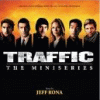 BS: Talking
about series, now it's time to refer to your last project: Traffic the
Miniseries. What can you tell us about this TV adaptation of a great
original film by director Stephen Sodenberg? BS: Talking
about series, now it's time to refer to your last project: Traffic the
Miniseries. What can you tell us about this TV adaptation of a great
original film by director Stephen Sodenberg?
JR: The film Traffic was based on a very well regarded
British TV series from the early 90s. The film was fantastic. The original was
about heroin smuggling between Pakistan and England, via Germany. Soderbergh moved
it to cocaine between Mexico and the US.
The recent television movie I just did
(6 hours in length) was much more broad. It showed the world of international
smuggling of drugs, guns, money, and even people. There is a network of 'middlemen,'
people that move things illegally around the worked for other people. It's amazingly
sad.
BS: How is the music, Mr. Rona?
JR: I worked with Cliff Martinez on the score to the film. But for the series, I wanted to do something different. More emotional, more energetic, but still based on an 'ambient' approach to the film.
BS: For all film music aficionados, Varése Sarabande's decision to release the soundtrack of this production has been an excellent piece of news. I think that labels specialized in film music are having a bad time due to the proliferation of free programs to download music. Do you think that one day will come when no soundtracks will be released because of this problem? How do you think that this problem could be solved beforehand?
JR: The CD came out extremely well. I hope people will check it out. TV projects, even big ones like Traffic, rarely get released on record. There is a limited number of signed copies available on my website www.jeffrona.com. Other scores and books as well.
BS: Changing the subject, what is your opinion
about the present situation of film music? Is there in your opinion any composer
or any score that stands out from all of the others?
Some critics accuse most composers of having lost the traditional values
of music, due to their use of electronic music and synthesizers... they seem
to be reluctant to accept this "kind of new language".
JR: Let me answer these questions together. there is greater
diversity in film music now than ever. Film scores were once very identifiable
in style and approach. No more. We have orchestral scores, electronic scores,
DJ scores, world music scores, hip hop scores, rock scores, song scores, jazz
scores, you name it. I think it is great. This diversity has brought so many
more interesting people into the world of film composition. Some don't compose
in the traditional sense. But they do something unique, and that is good.
M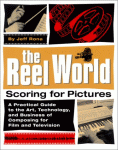 ost
successful composers today could not exist without the use of computers, synthesizers
and samplers. I certainly could not. And except for a few scores which may have
been cheapened by the use of electronics, they bring something to filmscores
that an orchestra can not. And vice versa. So let it be. Composition has become
a bit less important in recent years by the use of more music supervision, which
is a person hired to find existing songs by bands and other pop or rock artists
for the film. So a composer's work is just one element of the soundtrack. Lamentable,
but very in style now. ost
successful composers today could not exist without the use of computers, synthesizers
and samplers. I certainly could not. And except for a few scores which may have
been cheapened by the use of electronics, they bring something to filmscores
that an orchestra can not. And vice versa. So let it be. Composition has become
a bit less important in recent years by the use of more music supervision, which
is a person hired to find existing songs by bands and other pop or rock artists
for the film. So a composer's work is just one element of the soundtrack. Lamentable,
but very in style now.
BS: Please tell us something about The Reel World. It isn't usual for a film composer to write about film music. Personally, I consider The Reel World an essential manual to understand the world of soundtracks. What do you hope to achieve with this book? Which are your objectives?
JR: Several composers have written about their work, or about film music. Henry Mancini wrote a couple. Andre Previn wrote the greatest book on film scoring I ever read, called "No Minor Chords". Hysterical! My book "The Reel World" began as a series of diary-like articles I did for Keyboard Magazine, a very popular music magazine. I just describes my work and some of the people I work with, and it grew into a book. It is written for other composers to read, but it has become very popular with aficionados as well. It describes the art, methods and business of film music from the perspective of a composer.
BS:  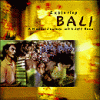 Apart from writing music for movies, you usually work with singer Lisbeth Scott in albums like Dove or Climb, providing some great music in records like Leaves From The Tree o Trance Planet 5. And specially your amazing music for Exploring Bali. What lead you to compose this score using Bali´s traditional music? Apart from writing music for movies, you usually work with singer Lisbeth Scott in albums like Dove or Climb, providing some great music in records like Leaves From The Tree o Trance Planet 5. And specially your amazing music for Exploring Bali. What lead you to compose this score using Bali´s traditional music?
JR: I was invited to go to Bali with some friends, and was excited. I found a man there who took me around to hear all the kinds of music created on the island. I brought some high end recording equipment for my own enjoyment, but created the CD along the way. It got a great review in England's The Wire magazine, calling it one of the 'essential' recordings of Balinese music.
BS: Finally, we would love to know which your more immediate projects at this moment are.
JR: I just am completing a documentary series for American TV. I am starting a film shortly, but I can not say the name quite yet. Sorry!
BS: BSO Spirit Community have among its members a young and talent group of composers who dream in a future with having the opportunity that have been given to you, What advices would you give them?
JR: Never stop writing. Write every day. Invest in good technology for your studio, and learn to use it as well as Yo Yo Ma plays the cello. There is no excuse for a poor sounding demo. Go to the movies as often as you can, see lots of different kinds of movies and listen to them very, very carefully. Set your standards very high. Be yourself.
BS: Thank you for your time. It has been a
pleasure to have you with us in BSO Spirit.
The BSO Spirit crew is preparing an homage to Michael Kamen, who
as you know recently passed away. We are gathering opinions from several composers
about his work or person. If you want to contribute we would be very happy to
have your collaboration.
JR: Kamen was an extraordinary musician. One of the best.
He once said that the secret to writing good themes was to make them 'inevitable'.
They should sound like they could exist no other way.
Interview by Miguel del Chicca and Pablo Nieto.
|





